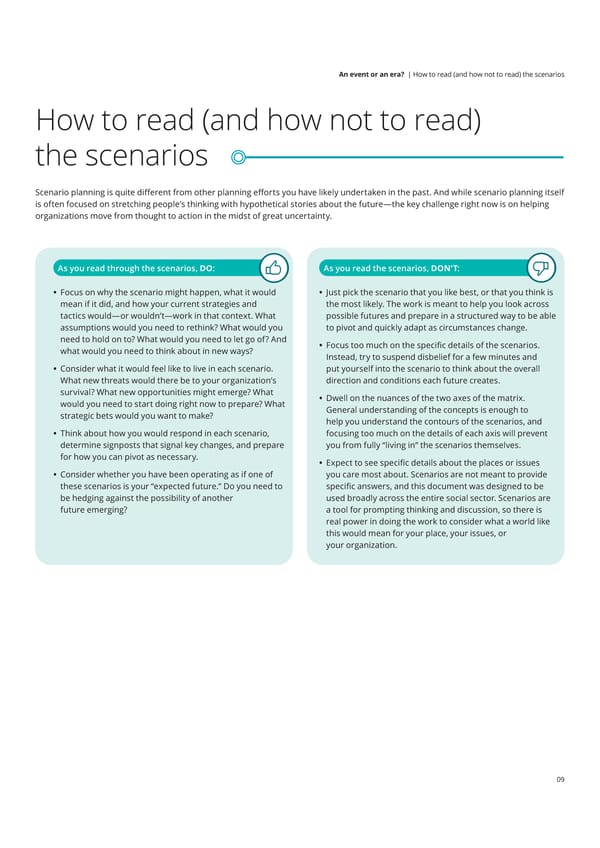An event or an era? | How to read (and how not to read) the scenarios How to read (and how not to read) the scenarios Scenario planning is quite different from other planning efforts you have likely undertaken in the past. And while scenario planning itself is often focused on stretching people’s thinking with hypothetical stories about the future—the key challenge right now is on helping organizations move from thought to action in the midst of great uncertainty. As you read through the scenarios, DO: As you read the scenarios, DON’T: • Focus on why the scenario might happen, what it would • Just pick the scenario that you like best, or that you think is mean if it did, and how your current strategies and the most likely. The work is meant to help you look across tactics would—or wouldn’t—work in that context. What possible futures and prepare in a structured way to be able assumptions would you need to rethink? What would you to pivot and quickly adapt as circumstances change. need to hold on to? What would you need to let go of? And • Focus too much on the specific details of the scenarios. what would you need to think about in new ways? Instead, try to suspend disbelief for a few minutes and • Consider what it would feel like to live in each scenario. put yourself into the scenario to think about the overall What new threats would there be to your organization’s direction and conditions each future creates. survival? What new opportunities might emerge? What • Dwell on the nuances of the two axes of the matrix. would you need to start doing right now to prepare? What General understanding of the concepts is enough to strategic bets would you want to make? help you understand the contours of the scenarios, and • Think about how you would respond in each scenario, focusing too much on the details of each axis will prevent determine signposts that signal key changes, and prepare you from fully “living in” the scenarios themselves. for how you can pivot as necessary. • Expect to see specific details about the places or issues • Consider whether you have been operating as if one of you care most about. Scenarios are not meant to provide these scenarios is your “expected future.” Do you need to specific answers, and this document was designed to be be hedging against the possibility of another used broadly across the entire social sector. Scenarios are future emerging? a tool for prompting thinking and discussion, so there is real power in doing the work to consider what a world like this would mean for your place, your issues, or your organization. 09
 US Deloitte Monitor Institute Page 8 Page 10
US Deloitte Monitor Institute Page 8 Page 10